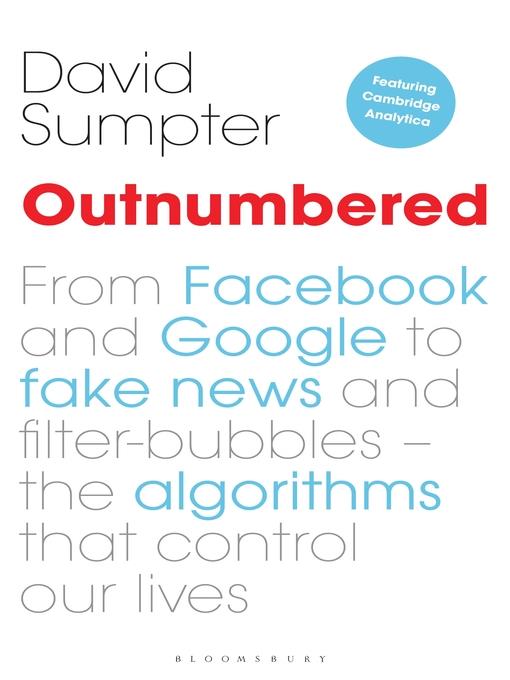
Outnumbered
From Facebook and Google to Fake News and Filter-bubbles – The Algorithms That Control Our Lives
- اطلاعات
- نقد و بررسی
- دیدگاه کاربران
نقد و بررسی

April 30, 2018
At a time of widespread concern about technology exerting too much influence over people’s lives, mathematics professor Sumpter (Soccermatics) devotes this enlightening book to investigating these fears and explaining clearly what algorithms do. He tackles different examples of their appearance in daily life, starting with in-the-news attempts to use the internet to study and influence voters. He discusses data harvested from Facebook users regarding their preferences in politics and other areas (theoretically, Democrats “could focus on getting the vote out among Harry Potter fans”), observing that, thankfully, the data’s accuracy is limited by the algorithim designers’ own inherent biases. As to the fake news disseminated on Facebook and other content aggregators, Sumpter believes that, for most people, it has little real impact. A more worrying phenomenon, he believes, is how advertising algorithms lead consumers. By reading, buying, or watching what is suggested to them, readers miss out on things that don’t fit into the math, since “when we are shown too much information, our brains decide that the best thing to do is just ignore it.” In his clear account of how algorithms work, Sumpter provides comfort to those who fear them as an insidious form of mind control, concluding that the real work is to address human biases.

May 15, 2018
Further frighteningly convincing research about the data infiltrating our lives.Experts regularly warn us that today's digital technology can extract our innermost secrets. In this ingenious addition to the genre, Sumpter (Applied Mathematics/Univ. of Uppsala, Sweden; Soccermatics: Mathematical Adventures in the Beautiful Game, 2016, etc.) agrees that there is some truth in this assessment but also serious limitations. The book, less a polemic than a combination of investigative journalism and (mostly) painless mathematical lessons, explains how social media, search engines, and merchants extract our opinions and manipulate them with a set of rules called an algorithm, which can often reveal our tastes, personality, and politics. Readers comfortable with ads tailored to previous purchases may flinch to learn that every mouse click such as a "like" under a photo, joke, or film clip enters a massive digital archive that reveals an unnervingly accurate portrait of the clicker. "Unlike our friends--who tend to forget the details and are forgiving in the conclusions they draw about us--Facebook is systematically collecting, processing and analyzing our emotional state," writes the author. "It is rotating our personalities in hundreds of dimensions, so it can find the most cold, rational direction to view us from." Persuading us to buy stuff seems benign, but the internet also teems with fake news scientifically designed to influence our votes. Sumpter returns repeatedly to the surprise victories of Donald Trump and Brexit. Wielding his mathematical tools, the author explains how algorithms deal with big data, and it turns out there is less there than meets the eye. Polls only calculate the odds of an event; they can't "predict" anything. True believers lap up fake news, but it has a barely detectable effect on changing the average reader's mind.Americans readers should look past the Britishness of the text to find a deliciously insightful, mildly skeptical analysis of internet data manipulation.
COPYRIGHT(2018) Kirkus Reviews, ALL RIGHTS RESERVED.

Starred review from June 1, 2018
Sumpter, a professor of applied mathematics, notes how at social gatherings it's not if?but, rather, when?talk will turn to tech companies' manipulation of humanity. Every digital deed, down to actions as basic as moving a computer mouse, reveals our interests and fuels algorithms aimed at predicting our behavior. Sumpter exposes false claims about the power of algorithms, such as Cambridge Analytica's pretense that it could manipulate voters with digital messages. In another example, researchers found disturbing flaws in algorithms used for prisoner sentencing. Indeed, with modern life permeated by computers, it might be irresponsible not to read books like this, which inform citizens and obliterate tech-company hype. Algorithms reward all clicks, even when they're random. This means that many of the people and products that top online searches are mediocre, and, if memories could be erased, new searches with the same choices would yield different results. As for robots, Sumpter explains that our most advanced AI cannot even simulate the survival intelligence of the most rudimentary bacteria. Yes, writes Sumpter, algorithms can empower us by processing oceans of data. But we must be clear-eyed about their ability and make sure they benefit most people.(Reprinted with permission of Booklist, copyright 2018, American Library Association.)




دیدگاه کاربران